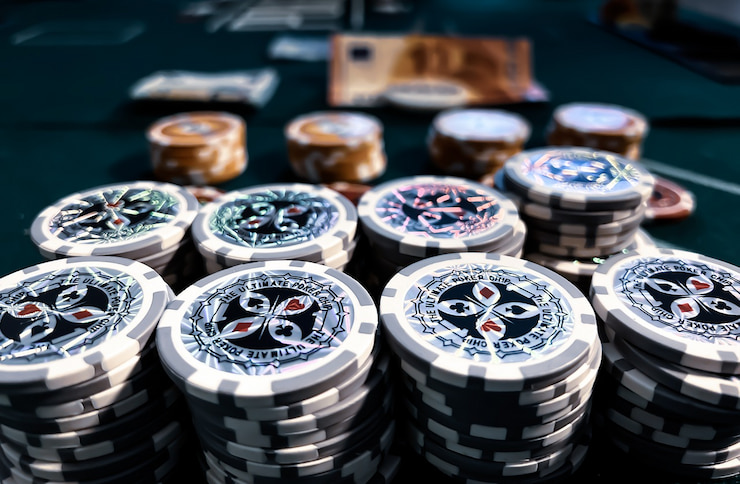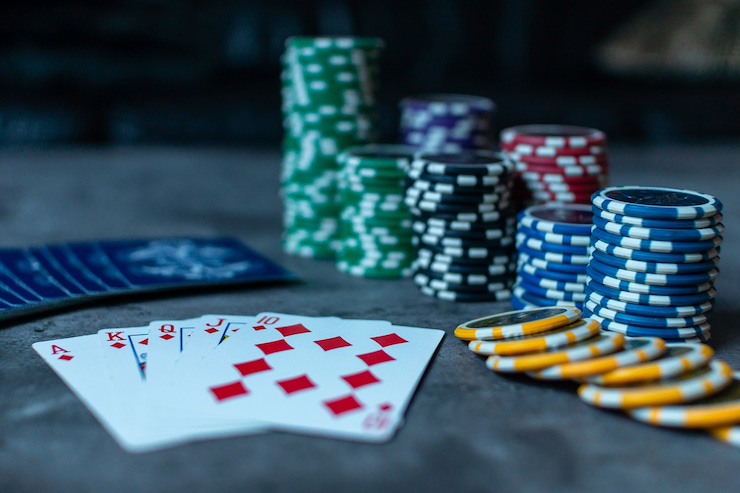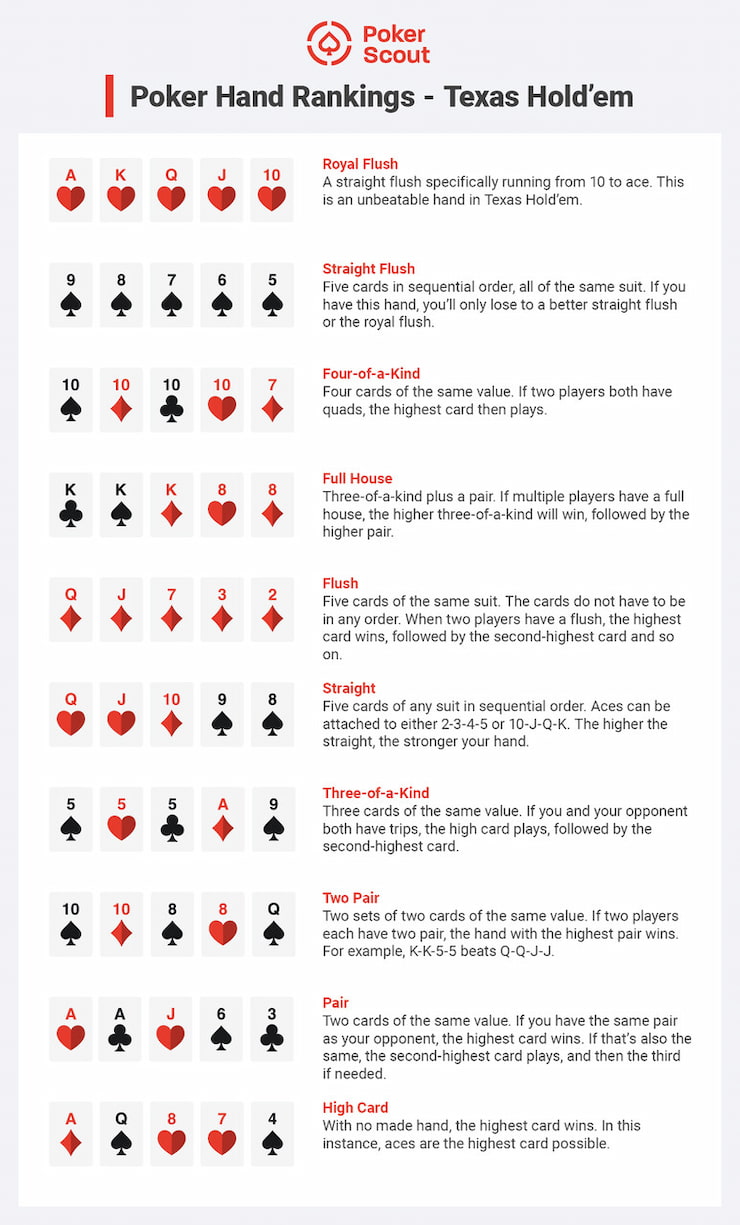Figuring out how to play poker might seem daunting, but it’s pretty straightforward. Learning hand rankings, poker rules, betting types, and bluffing makes this popular game exciting.
This beginner’s guide will cover basic poker rules, variations, hands, strategy, and tips to help you get started.
How to Play Poker
The first step in understanding how to play poker for beginners is to learn the basic terms and concepts of the game. In this section, we’ve created a complete poker tutorial for beginners, explaining the key elements of poker, like players, cards, chips, and betting terms, to help you build a solid foundation.
If you’re already familiar with how chips and bluffing work, you can skip ahead or check out the best US poker sites to start playing some low-stakes events.
Players
Unlike most casino games, poker is played among players. You can’t play poker alone, like you would a slot game, or with a dealer, like at a baccarat table. If there aren’t enough players, the games stop running.
Poker tables consist of anywhere from two to 10 players plus a dealer. However, if you’re in a tournament, there can be hundreds of tables of players all competing with one another.
Whenever you’re reading poker guides, keep this in mind: you’re not competing with the house, you’re competing with other players. This differentiates poker from roulette, blackjack, and other casino games with a house edge. In poker, the prizes always end up in the players’ hands.
Chips
After making a deposit and joining a table online, your cash will automatically be swapped for chips. You then use these chips to place bets based on the strength of your hand.
Chips may or may not have a monetary value, depending on whether you’re playing a cash game or a tournament. You’ll learn more about that later in this poker guide.

Cards
Poker is played with a single deck of 52 cards. The number of cards you’re dealt depends on the poker variant. Most commonly, you’ll get two face-down cards, but it could be three, four, five, or even more, depending on the game.
There are also face-up cards, called community cards. These can be shared by any player at the table. They’re the ones which are dealt in the middle of the felt.
In some poker variants, you’ll be dealt face-up cards that are just for you. However, the general rule is that if you can see a card, you can use it in your hand, except in games like Stud.
Bluffing
Bluffing is one of the most important aspects in the game, but it’s also one of the biggest mistakes you can make when first figuring out how to play poker for beginners.
A bluff in poker is when you pretend to have a better hand than you do with the aim of getting your opponents to fold. This is often in the form of a confident bet, when in reality, you know you have very little chance of winning the hand.
Unlike James Bond films, most bluffs are not elaborate, all-in, bet-the-house-and-kids-with-nothing wagers. Instead, the best bluffs are often small, nuanced, and perfectly timed.
When you first learn how to play poker, leave bluffing out entirely. Then, once you get familiar with the rules and how it works, you can bring it into your game more and more.
Poker Rules
Before you can sit down at a table, you need to thoroughly understand the basic poker rules. This will stop other players from detecting your inexperience, and it’ll help you know what’s going on around you.
The Deck
The deck consists of 52 cards, and the house will never use multiple decks in a single game.
In live games, you might see the dealer using two decks. These aren’t used in the same hand, though – they’ll alternate between the two. This is simply to speed up the shuffling process.
Bet Limits
Certain types of poker have betting limits while others don’t. There are three main types:
- No limit. This is the most common form of poker, in which you can bet as much as you want at any stage.
- Pot limit. Another popular version is pot limit, where you can’t bet more than the number of chips in the pot.
- Fixed limit. An even more restrictive format which is usually limited to the small bet and big bet, with a fixed maximum number of bets and raises each round.
If you’re beginning your journey of how to play poker online, it’s easy to see the betting limits before you take your seat. All of the information will be in the lobby. Study it as long as you need to before getting involved.
All In
Going all in means you’re putting all of your chips on the line for that particular hand.
If you’re learning how to play poker, going all in may seem scary. But it’s an essential move which you’ll need to use repeatedly in a tournament if you have any chance of winning. In fact, even if you keep folding, you’ll end up all in by default!
One thing which is often confusing to new players who are looking at the rules of poker is how an all in works when two players have different chip stacks.
Here’s a simple example:
- Player A has 3,000 chips and Player B has 5,000 chips.
- Player A bets 1,000.
- Player B raises all in to 5,000.
- Player A doesn’t have enough to call – but that doesn’t mean they’re out of the hand. Instead, Player A calls all in for their remaining 2,000.
- The pot is now 6,000, which is 3,000 from each player. The additional 2,000 chips are returned to Player B. There is no further betting in that hand. Any remaining cards are dealt, and the winner is declared.
Jokers
When you’re playing poker online or at a live tournament, there are no jokers in the deck.
This can sometimes present a learning curve for players who are used to home games, where you might be used to playing with jokers which are wild. Home game rules don’t always carry over, and this is one common example.
Types of Poker Bets
No online poker tutorial for beginners would be complete without clear explanations of the different types of bets you can make. If you don’t learn these, you won’t know what your options are at the table.
A check in poker means that you are passing your turn to the next player without voluntarily adding more chips to the pot.
Checking is common, and has many uses:
- Helps prevent the pot from growing too large
- Gives you a chance to see what your opponent wants to do
- Can be used as a trap to lure your opponent into betting
You can only check once you’re already involved in a hand. In the first stage of the hand, you’ll need to bet or call a small number of chips to indicate that you’re in.
Raising is an important move in poker in which you increase the number of chips needed to continue in the hand. It indicates strength, and can often force your opponent off of their hand.
However, when it goes wrong, raising can cost you a lot or even all of your chip stack.
If your opponent makes a bet and you want to stay in the hand, but don’t want to raise it up any further, you can call. This means matching the bet of your opponent.
Once all players in the hand have called, the next street is dealt. If it’s the final stage of the hand and all players call, it goes to showdown, where the best hand wins.
One major problem new players have when learning how to play poker is calling too often and then folding before showdown, which is a guaranteed way to lose chips. If your hand is too weak, you should consider folding early. Or, if it’s strong, you want to try and get more chips in the pot.
There’s no shame in a fold, and you’ll fold most of the hands you play whether you’re just learning how to play online poker or you’re a seasoned veteran.
You will want to fold most weak hands pre-flop, and when you think your opponent has a superior hand which is too strong to bluff them off of.
A bet is similar to a raise in poker. The difference is that a bet is the first action where chips are added, which can then be followed by a raise, or series of raises.
If everybody is checking around the table and you want to charge them to see the next card, you can stick in a bet.
When You Can Bet in Poker
If you’re following our beginner’s guide to poker, you now know all the different types of bets you can make. Next, it’s time to learn when you can make them.
When you’re learning how to play poker online, you’ll usually only be given options which you’re allowed to make, which makes it impossible to make a mistake such as acting out of turn.
There are some variations based on which poker game you’re playing. For now, we’ll stick to the five most common rounds (or “streets”) in common game types.
Pre-Flop
This is the first round of betting in a hand. Each player receives their face-down cards (known as “hole cards”) and views them in private.
Action then moves round in a clockwise direction. All players should base their actions on previous actions and their poker positions. Each player can choose to exit the hand by folding or stay in by calling the minimum bet. They also have the option to raise, charging other players more in order to see a flop.
Flop
Once the pre-flop action concludes, community cards are dealt. In Texas Hold’em, this means three cards face-up in the middle of the table. All players can use these cards in combination with their hole cards, which remain hidden from their opponents.
Whether you play live poker or online poker, the round of betting moves clockwise from the player left of the dealer button.
Turn
After the flop betting is completed, the next card is dealt – the “turn”. Action again begins from the left of the dealer.
In any of these streets, if all players except one fold, the hand ends, and the remaining player wins the pot.
River
A final card is dealt, and then the final betting opportunity starts. If you’re bluffing, this is your last chance to push your opponent off of their hand before you get found out. If you have a strong hand, it’s your last chance to win some extra chips.
Showdown
Finally, if two or more players are still in after the river, it goes to a showdown. This is when you flip your cards on their backs, and the best hand wins.
Don’t worry if you just found out how to play poker, because this part happens automatically online. If necessary, the poker dealer will flip your cards over for you and award the chips to the winner.
Poker Variants
Once you know how to play online poker and you’re browsing the online lobby, you’ll see lots of different versions of poker, each with their own poker game rules. It might be tricky knowing where to start.
When you’re new to poker, Texas Hold’em is definitely the safest starting point. You can learn it quickly, then develop your game at the best poker training sites. You can add other poker variants as you become more experienced, with some concepts actually boosting your Texas Hold’em skills as well.
Here’s a brief explanation of the different types of poker you can play.
Texas Hold’em
Many players want to learn to play Texas Hold’em, as it is by far the most popular version of poker.
In this game, you’re dealt two hole cards followed by three community cards (the flop), a fourth (the turn), and a fifth (the river). Your goal is to make the best five-card hand using whichever cards work best.
Omaha
There are significant similarities and differences in how to play Omaha versus Hold’em. In Omaha, you’ll receive four hole cards instead of two. However, you must use precisely two hole cards and three community cards.
Betting rounds work the same way as Hold’em. However, it’s more common to find Omaha in a pot limit format. This helps limit too many all-ins, which is needed because Omaha hands are often packed with potential for future streets.
These are three common variants of Omaha, with the most popular being Omaha Hi:
- Omaha Hi
- Omaha Hi/Lo (PLO8)
- Five-Card Omaha (PLO5)
3 Card Poker
3 Card poker is a version of casino poker, where you compete against the house rather than other players. Traditional poker strategies like bluffing cannot be applied in this game. Since the house has a built-in edge, players may lose over time. However, you can still learn how to play 3 Card Poker to understand the basic rules and strategy.
Stud
Seven-Card Stud used to be the go-to game in poker, but has been overtaken by Hold’em, and it’s now much harder to find stud events with huge guarantees.
Unlike Hold’em and Omaha, there are no community cards in Stud. Instead, you receive a mixture of face-up and face-down cards. Your opponents will be able to see some of your cards, adding an interesting nuance to bluffs.

Draw
Draw poker is where you’re able to throw away cards and collect new ones to improve your hand strength. This may be one of the ways you first figure out how to play poker, as it’s popular for home games.
Learning how to play Five Card Poker is a good starting point, but there are tons of draw formats in poker, including:
- Lowball Draw Poker
- Deuce to Seven Lowball
- Archie
- Badugi
Short Deck Poker
Once you’ve mastered the rules of Hold’em, learning how to play Short Deck poker is pretty straightforward. The two are very similar, except Short Deck – also known as 6+ Hold’em – has fewer cards and a slightly tweaked hand rankings chart.
With all of the 2s through 5s removed, there are way more action hands, which explains why many pros love this format.
Mixed
Mixed games is not a specific type of poker per se, but – as the name suggests – a mixture of other games.
H.O.R.S.E. is one of the most well-known mixed games. Here’s what it stands for:
- Hold’em
- Omaha Hi
- Razz
- Stud
- Eight or Better Stud
In mixed games, you’ll play one version of poker then move on to the next after a certain amount of time or number of hands.
Poker Hands
There are a lot of poker game rules you need to learn to get started, but it’s also important to have a proper understanding of poker hands. We don’t want to overload you in this poker guide, but if you’re ready, you can find out more in our poker cheat sheet guide.
If you’re in a hurry, you can see our poker guide sheet below, which shows you the hand rankings for the most common version of poker.
Tournaments vs Cash Games
Poker is split into two categories: cash games and tournaments. If you’re just learning to play poker, tournaments can be a safer option. As you gain experience, later, you can explore cash games.
Tournaments
Even though there are all different types of tourney, you can still quickly learn how poker tournaments work on a basic level.
In a tournament, every player pays a fixed fee called a buy-in and receives the same number of chips. These chips have no direct monetary value. You then play until you’re eliminated.
A standard poker tournament payout structure will award prizes to the top 10-20% of players, and the best online poker tournaments have some huge guarantees.. There are two main reasons tourneys are better when you’re learning how to play poker:
- Limited losses. You know exactly how much you stand to lose as soon as you sit down. If it’s a $5.50 tournament, you can go all in and lose, and you’ve only lost the price of a cup of coffee.
- Fair fight. Every player starts with the same number of chips. This is different from cash games, where one player will usually have more money than the other.
Cash Games
When you play cash games, each chip has a dollar value. When you win, you’re winning straight cash that you can take to the bank. But when you lose, that’s actual money draining from your account.
- Higher risk/reward. This can be a pro or a con depending on how you look at it, but it’s certainly risky if you’re only just figuring out how to play poker.
- No time limits. In cash games, you don’t have to wait until you’re eliminated. You can come and go as you please – even after a single hand, if you like.
How to Play Poker at a Casino
If you want to join a live poker event at a casino, start by heading to the venue and checking in at the poker desk.
If there’s a tournament starting, you can register and pay the buy-in there. You’ll be allotted a random seat and table number, which is usually displayed over the table or on the table itself.
For cash games, you can either take a free seat or be added to a waiting list, depending on how busy the room is.
You’ll also see casino poker. This game is played against the house and, despite the name and similar rules, it’s a totally different game.
Alternatively, you can enjoy all types of poker online at the best offshore poker sites, such as CoinPoker.
Poker Tips for Beginners
Here are a few basic tips to keep in mind when you’re starting out at the tables:
- Try a Sit & Go. Keep things simple to begin with a one-table Sit & Go for a few bucks. It’s relatively low risk and will help you get familiar with how small tournaments work.
- Begin conservatively. A lot of new players feel pressure to bluff all the time, but your story needs to make sense. At first, take a simpler approach by focusing on higher-value hands.
- Stick to the plan. Don’t feel the need to copy other players’ styles. Just because you see someone win a big hand with 9♥3♣, it doesn’t mean you should start calling with junk hands.







